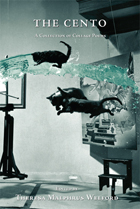Book Review
Theresa Malphrus Welford (ed.), The Cento: A Collection of Collage Poems, Red Hen Press, 2011
by Chloe Yelena Miller
Ideas multiply in print or online. It is a challenge for readers to stay current and understand the origins of ideas, not to mention their changing implications. The Cento: A Collection of Collage Poems, edited by Theresa Malphrus Welford, gives readers a chance to focus on past moments threaded into the present by means of these new poems. A wide breadth of poems, sources and interpretations, offer original writing and interpretations in the form of collage poems. These poems are printed on a steady (usually unadorned) page.
The term “cento” might bear some explanation. The editor uses the definition of cento that David Lehman uses in the introduction:
A cento is a collage-poem composed of lines lifted from other sources – often, though not always, from great poets of the past. In Latin the word cento means “patchwork,” and the verse form resembles a quilt of discrete lines stitched together to make a whole.
Through the centos, readers are brought to a number of places: The original poem, the new creation, the space in-between writings and readings. In each poem, something new has been created while quite literally keeping the original one alive.
Most of the poems identify their origins exactly—inspiration from well-known poets and prose writers to Marvel comics to New York Times obituaries to grocery labels and junk mail. Some origins are exact, say from a particular piece of writing, and others are more vague. Simply looking through the origins reminds readers, likely writers themselves, to pay attention to the grand and the miniscule around them.
These poems repurpose, rewrite and reorganize the original like a shift in genre or staging of the original work. Sharon Dolin reaches into the sky as she ends her poem of literal endings in “Char’d Endings,” a cento-sonnet using the closing lines of poems by Rene’ Char:
Keep us violent and friends to the bees on the horizon
Such is the heart
I hurt and am weightless
This movement forward of endings, even through to the end, reorganizes our thoughts while bringing attention to these very endings. This book can lead the reader through a wild library search of original pieces while providing enough right here.
Some of the poems respond to images instead of words. Diane Kendig’s “On Frida
Kahlo’s Diego on My Mind” responds directly to Kahlo’s painting, bringing the reader’s eye to a written translation of the painting while offering analysis. In the next to last line, Kendig asks, “What is there to know?” She answers, “Some shape of beauty moves away the pall.”
These patchwork poems are not regurgitations of a world that has already been written. Through reorganization, additions and the distance of time, something new can be found in each poem. Like the feeling of a new love or a sunset, readers have seen these emotions and, in some cases, some of the words before. The combination of place, voice and authorship brings the reader someplace new. What a beautiful destination.
I had some things
A cento made of lines from Emily Dickinson
I had some things that I called mine —
I asked no other thing —
I lost a world the other day —
I years had been from home —
I thought that nature was enough —
I took one draught of life —
I watched the moon around the house —
I could not drink it, sweet —
I felt my life with both my hands —
I gave myself to him —
I could suffice for him, I knew —
I think I was enchanted —
I was a phoebe, nothing more —
I stepped from plank to plank —
I learned at least what home could be —
I am alive, I guess —
—Catherine Chandler-Oliveira
That Would Be All of It
A cento from New York Times obituaries
The cause was heart failure,
underneath, a feeling of bewilderment.
Married twice, once to a man named Bacchus,
Mrs. Ryan liked to sew dolls and soft toys.
She sought enduring love a little ambivalently.
I had to exist apart from them.
The trick is not to get frightened.
When you’re dancing, don’t look down at your feet.
Life unfolded as a kind of scroll.
His book was not as realistic as mine.
This was just a story to him.
He had been unable to hunt down only one flower he sought.
More than once he had to be talked down from a bridge,
sending out what he called a briefer signal.
The odds of survival can be almost insurmountable.
I thought the whole point was that we wouldn’t feel stranded.
In my innocence I wanted to know everything,
have the courage to travel to those dimly lit spaces,
the idea of creating a new shadow on earth.
It started as a lark but ended as an ostrich.
I got tired of passing the houses of my dead friends.
They did not always wind up where they intended.
—Mary Lyon
Chloe Yelena Miller is a writer and teacher living in Washington, D.C., with her husband and their many books. Her poetry chapbook, Unrest, is forthcoming from Finishing Line Press. Chloe teaches writing online at Fairleigh Dickinson University, George Mason University and privately, and leads writing workshops at Politics & Prose Bookstore in Washington, D.C. Contact her and read some of her work at www.chloeyelenamiller.blogspot.com.


